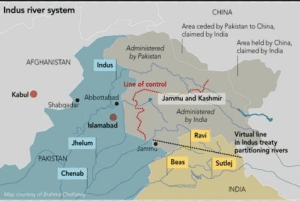TAG: GS 2: INTERNATIONAL RELATIONS
THE CONTEXT: For the first time in over five years, a Pakistani delegation arrived in Jammu recently to inspect two hydroelectric power projects in Jammu and Kashmir under the IWT.
EXPLANATION:
- The delegation’s visit is part of Neutral Expert proceedings aimed at resolving disputes related to the design and operation of these projects.
Hydroelectric Projects Under Inspection
- The delegation will inspect the Kishenganga and Ratle hydroelectric power projects located in the Chenab valley.
- Previously, in January 2019, a three-member Pakistani team inspected the Pakal Dul and Lower Kalnai hydroelectric power projects under the IWT before diplomatic relations soured following the revocation of Jammu and Kashmir’s special status.
Historical Context and Dispute Resolution Efforts
- In 2016, Pakistan initially requested the World Bank to address its objections to the design features of the Kishenganga and Ratle projects through a Neutral Expert.
- However, Pakistan later withdrew this request and sought resolution through a Court of Arbitration.
- India, advocating for the issue to be settled via Neutral Expert proceedings, disagreed with this approach.
Role of the World Bank and Recent Developments
- After prolonged negotiations, the World Bank appointed both a Neutral Expert and the chair of the Court of Arbitration in October 2022.
- India issued a notice for modifying the Treaty, cautioning that simultaneous consideration of the same issues by both mechanisms was not stipulated under the IWT.
- In July 2023, the Court of Arbitration declared its competence to adjudicate Pakistan’s request for arbitration.
Legal Proceedings and Inspections
- Pakistan filed its first Memorial in March 2023, detailing its legal case with supporting documents.
- In April 2023, the Court conducted a week-long visit to the Neelum-Jhelum Hydro-Electric Plant in Pakistan-Occupied Kashmir to understand the design and operation of run-of-river hydroelectric plants on the Indus system.
- While India opted out of the Court of Arbitration proceedings, it submitted a Memorial to the Neutral Expert in August 2023.
- Pakistan participated in a subsequent meeting in Vienna in September 2023, where organizational details for the site visit were discussed.
- The Jammu and Kashmir administration appointed 25 liaison officers to facilitate the visit of the Neutral Experts, alongside delegations from India and Pakistan.
- This coordination ensures smooth logistics and effective communication during the inspection process.
Indus Waters Treaty
- It was signed in 1960 after nine years of negotiations between India and Pakistan with the help of the World Bank, which is also a signatory.
- The Treaty allocates the Western Rivers (Indus, Jhelum, Chenab) to Pakistan and the Eastern Rivers (Ravi, Beas, Sutlej) to India.
- At the same time, the Treaty allows each country certain uses on the rivers allocated to the other.
- The Treaty sets out a mechanism for cooperation and information exchange between the two countries regarding their use of the rivers, known as the Permanent Indus Commission, which has a commissioner from each country.
- The IWT requires Pakistan that it is under obligation to let flow and shall not permit any interference with the waters of the eastern rivers.
- India is also obligated to let flow all the waters of the western rivers and shall not permit any interference with these waters except for certain uses, which include the generation of hydroelectric power on the rivers and tributaries of the western rivers before they flow into Pakistan.
- The Treaty also sets forth distinct procedures to handle issues which may arise: “questions” are handled by the Commission; “differences” are to be resolved by a Neutral Expert; and “disputes” are to be referred to an ad hoc arbitral tribunal called the “Court of Arbitration.”
- As a signatory to the Treaty, the World Bank’s role is limited and procedural.
- In particular, its role in relation to “differences” and “disputes” is limited to the designation of individuals to fulfil certain roles in the context of Neutral Expert or Court of Arbitration proceedings when requested by either or both of the Parties.


